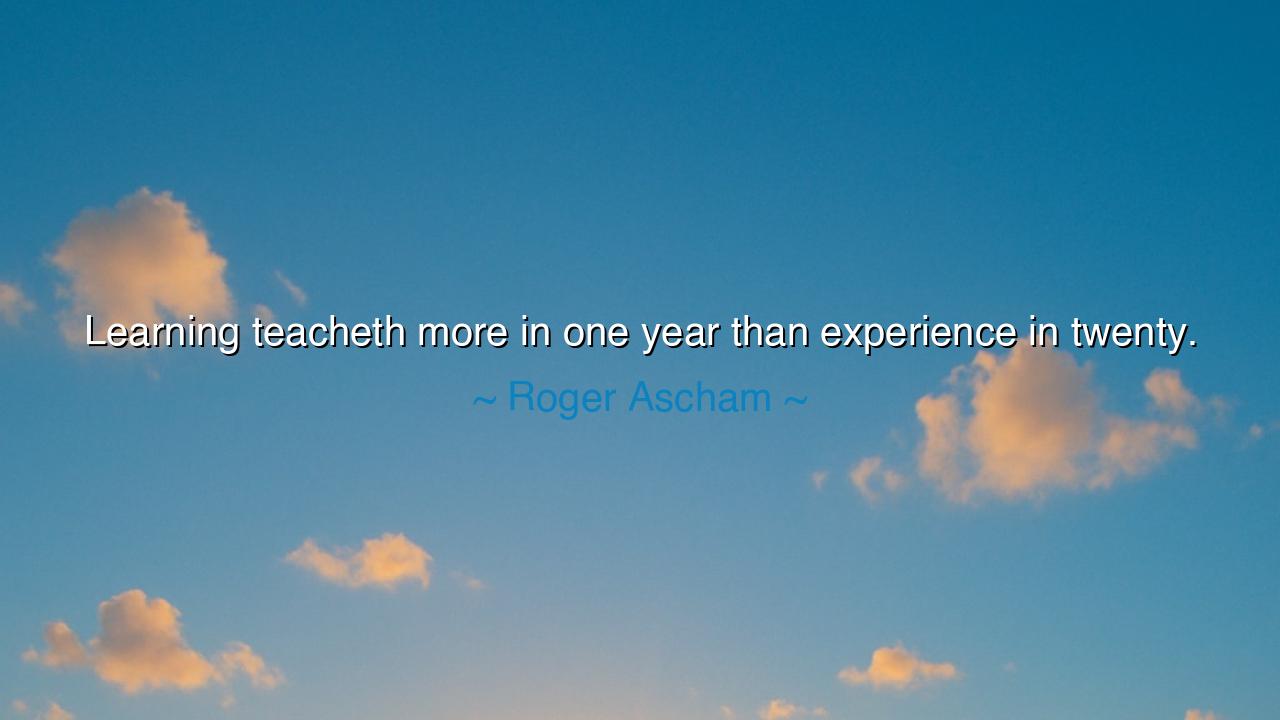
Learning teacheth more in one year than experience in twenty.






In the wise and resonant words of Roger Ascham, tutor to the great Queen Elizabeth I, “Learning teacheth more in one year than experience in twenty.” This ancient truth, spoken in the age of candlelight and parchment, burns still with undiminished flame. Ascham, who devoted his life to the pursuit of wisdom and the refinement of the human mind, saw clearly what many fail to understand: that learning, when undertaken with humility and discipline, can compress the wisdom of decades into days. For experience may be a stern teacher, but it is slow and costly — its lessons often paid for in pain, failure, and the passing of precious years. Yet learning, if rightly pursued, opens the path of understanding without the wounds of folly.
The origin of this quote lies in the Renaissance, an age when the world was awakening from the long night of ignorance and turning once again to the light of knowledge. Roger Ascham, a scholar, humanist, and teacher, believed that education was not mere memorization, but the shaping of the soul — that learning sharpened the intellect and ennobled the heart. In his time, many trusted only in experience, believing that wisdom could come only through age and hardship. But Ascham, observing the brilliance of his pupil Elizabeth, saw that guided study could raise a young mind to greatness more swiftly than years of untrained wandering. His words, then, were both a declaration and a challenge: that the deliberate cultivation of knowledge surpasses the accidental lessons of life.
To understand his meaning, one must grasp the difference between learning and experience. Experience teaches by consequence — it strikes the hand that errs, it humbles the pride that acts without foresight. But learning, illuminated by reason, gives the mind the power to foresee those consequences before they occur. The experienced man says, “I have fallen, therefore I have learned not to stumble.” The learned man says, “I have studied the path, and so I shall not fall.” Experience teaches us what has been, but learning reveals what may yet be. In this, it is the higher wisdom — not merely reaction, but revelation.
History is filled with examples of those who proved Ascham’s words true. Consider Alexander the Great, pupil of the philosopher Aristotle. Though young when he began his conquests, Alexander possessed a mind sharpened by study, a soul trained in reason and strategy. His teacher had shown him not only the art of war, but the philosophy of men and nations. Thus, Alexander accomplished in a few years what others could not in a lifetime. He understood that learning is not a cage but a compass — that the study of ideas gives mastery over actions. Without that foundation, even his courage would have been blind. It was learning, not age, that made him great before he was thirty.
And yet, Ascham does not dismiss experience entirely. For learning without living becomes hollow, and knowledge untested by life’s trials can grow brittle. The wise do not choose between the two; they understand that learning refines experience, just as the mind guides the hand. Experience may show us how to endure the storm, but learning teaches us how to read the sky before it breaks. Together, they make a whole man — yet it is learning that lights the way first. Without it, experience stumbles in the dark, mistaking scars for wisdom and pain for progress.
In the spirit of Ascham’s teaching, let us remember that learning is not confined to schools or books. It is the practice of reflection, the discipline of curiosity, the willingness to ask why. To read deeply, to listen earnestly, to think before acting — these are the acts that multiply the power of a single year beyond the fruit of twenty. Those who neglect learning are condemned to repeat the same lessons through hardship, but those who study grow through understanding. For the mind, once illuminated, no longer gropes its way through the shadows of ignorance; it strides with confidence toward truth.
The lesson, dear listener, is as clear as it is eternal: do not wait for experience to teach what learning can reveal. The wise seek instruction before they are forced to seek forgiveness. The young who hunger for knowledge rise faster than the old who rest upon their past. Study, therefore, not merely to know, but to live wisely. Let the words of Ascham be your guide — that through learning, you may gather in one year what life alone might take a lifetime to yield. For while experience may be the teacher of fools, learning is the crown of the wise — and the one who chooses it walks not behind the world, but before it.
So let the echo of Roger Ascham’s wisdom resound through the ages: “Learning teacheth more in one year than experience in twenty.” Cherish your teachers, your books, and your moments of study. Seek not only to live, but to understand living. For in learning, the soul stretches beyond time — gathering in a single year the wisdom of centuries, and leaving behind a light that even experience cannot dim.






AAdministratorAdministrator
Welcome, honored guests. Please leave a comment, we will respond soon